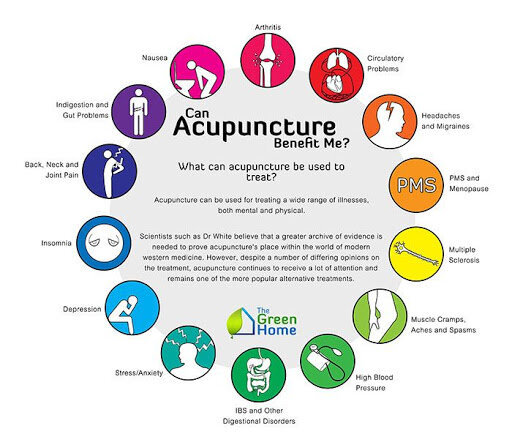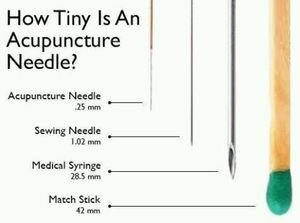Acupuncture FAQ
Does Acupuncture Work?
Acupuncture has been recognized by the National Institute of Health (NIH) and the World Health Organization (WHO) as an effective treatment (proven in controlled trials) for a wide variety of medical disorders and symptoms. Research into acupuncture as a medical treatment has grown exponentially in the past 20 years. The U.S. Department of Veteran Affairs recently summarized and updated the systematic reviews of acupuncture. They found acupuncture to be effective in treating 117 conditions.
What Does Acupuncture Treat?
Acupuncture’s efficacy at treating a wide range of issues is well documented in the medical literature. Numerous studies on the benefits of acupuncture conclude that it safely and effectively treats a wide variety of conditions ranging from musculoskeletal problems (e.g. back pain and neck pain, among others) to infertility, headaches, insomnia, anxiety, and depression.
Common Disorders
Low back pain Sciatica // Headache and migraines // Neck pain // Depression // Insomnia // Anxiety // Shoulder pain, Bicep Tendonitis, Frozen Shoulder // Tennis Elbow // Golfer’s Elbow // Carpal Tunnel // Knee pain // Hip pain // Bursitis // Chemotherapy induced nausea and vomiting // Ankle sprain and pain // Achilles tendonitis // Plantar fasciitis // Mortons neuroma // Neuropathy // Postoperative pain, Postoperative nausea and vomiting // Leukopenia // Cancer Pain // Nausea & Vomiting // Meneire's Disease // Rheumatoid arthritis // Osteoarthritis // Seizure disorders // Hypertension // Stress // Bell's Palsy // Fibromyalgia // Temporomandibular joint dysfunction, TMJ, Jaw Pain // PTSD // Vertigo // Tinnitus
Digestive Disorders
Acute and chronic gastritis // Morning sickness GERD // Heartburn // Acute and chronic Colitis // Constipation & Diarrhea // Irritable Bowel Syndrome
Women’s Health Disorders
Fertility // Lactation // Morning sickness // Malposition of the fetus (Breech baby) // Hot flashes // Night sweats // Perimenopausal and menopausal syndrome // Painful and irregular periods // Postpartum depression // Polycystic ovarian syndrome // endometriosis // Delayed labor
Immune System Disorders
Ear infections // Asthma // Allergies // Eczema // Common Cold // Allergic rhinitis // Sinus headache // Bell’s Palsy
Pediatric and Adolescent Disorders
Pediatric oncology patients (nausea & pain) // ADHD, ADD // Learning difficulties & developmental delays // Cerebral Palsy // Reflex Sympathetic Dystrophy // Allergies // Anxiety // IBS
Is Acupuncture Covered by Insurance?
More and more insurance plans are covering acupuncture. We work with many insurance carriers in and out of network to include; Blue Shield of CA, Cigna, Blue Cross Blue Shield, Anthem Blue Cross, Aetna, and HealthNet. Medicare does not cover acupuncture at this time. Each carrier's benefits are different according to your specific plan. At Life Point in Newport Beach, we will happily verify your insurance before your treatment so you know exactly what you’ll pay. Email Renee at renee.lifepointacu@gmail.com or call the office at (949) 387-8715.
Does Acupuncture Hurt?
Acupuncture should not be painful. There are a number of sensations that can occur during your acupuncture treatment. Most patients do not feel anything when the needles are inserted. There can be a pinch on insertion in sensitive areas. There can also be a dull ache felt after the needles have been inserted, which is an indication that the acupuncture is stimulating blood flow and to the area.
What is Required to Become an Acupuncturist?
An acupuncturist practicing in the state of California must complete a 4-year Master of Science program including a 2-year internship in order to sit for the California Acupuncture Board Exam. The program consists of comprehensive exams that test both written and practical understanding of both western and eastern medicine diagnosis, traditional Chinese medicine theory, physical exam, herbal medicine, and nutrition.
How Does Acupuncture Work?
Acupuncture is the placement of single use, solid, sterile needles that are as thin as a human hair (we use 40 gauge needles in comparison to the standard 21 gauge hypodermic needle used to draw blood in a blood test).
The needles are inserted at specific sites on the surface of the skin - acupuncture points - that alter biochemical and physiological conditions in the body. Inserting needles at these points stimulates sensory receptors, which stimulate nerves that transmit impulses to the brain.
The brain responds to these impulses by releasing neurotransmitters and hormones including serotonin and endorphins, the body's natural pain-killing hormones.
Other physiological effects include increased circulation, decreased inflammation, muscle relaxation, and increased T-cell count to strengthen the immune system.
How Many Treatments Do I Need?
Many of the patients at Life Point Acupuncture come in on a regular basis the manage stress, boost their immune system and manage chronic pain. These patients come in once a week, biweekly, or once a month depending on their personal stress and the severity of the condition being treated. Patient’s seeking treatment for acute and specific conditions, such as low back sprain or strain, come in for a a protocol of 4-8 sessions once or twice a week.
Does Acupuncture Work for Fertility?
Acupuncture boosts fertility by reducing stress, increasing blood flow to the reproductive organs, regulating the menstrual cycle, and balancing the endocrine system (hormones). It Clinical research has demonstrated that acupuncture during IVF increases the success by 50%. According to researchers, acupuncture increases blood flow to the ovaries during the stimulation phase of IVF and improves the effectiveness of the drugs given. The study notes that IVF acupuncture also:
Relaxes the uterus and addresses uterine spasm after embryo transfer
Reduces stress and calms anxiety
Offsets side effects of the fertility drugs
In 2008, the British Medical Journal published a study that showed that women who received acupuncture with IVF treatment were 65% more likely to have a successful embryo transfer.




